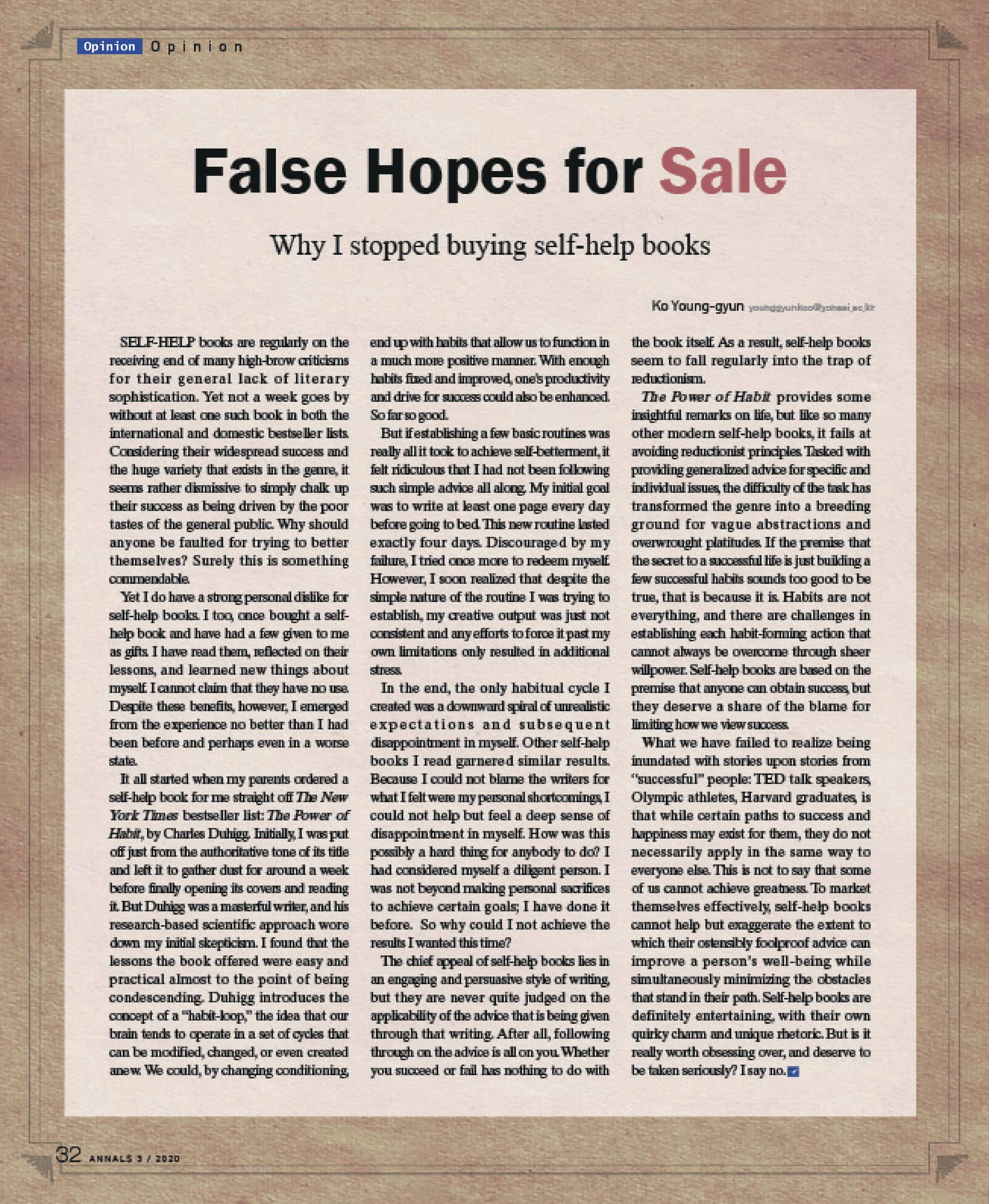Why I stopped buying self-help books

SELF-HELP books are regularly on the receiving end of many high-brow criticisms for their general lack of literary sophistication. Yet not a week goes by without at least one such book in both the international and domestic bestseller lists. Considering their widespread success and the huge variety that exists in the genre, it seems rather dismissive to simply chalk up their success as being driven by the poor tastes of the general public. Why should anyone be faulted for trying to better themselves? Surely this is something commendable.
Yet I do have a strong personal dislike for self-help books. I too, once bought a self-help book and have had a few given to me as gifts. I have read them, reflected on their lessons, and learned new things about myself. I cannot claim that they have no use. Despite these benefits, however, I emerged from the experience no better than I had been before and perhaps even in a worse state.
It all started when my parents ordered a self-help book for me straight off the New York Times bestseller list: The Power of Habit, by Charles Duhigg. Initially, I was put off just from the authoritative tone of its title and left it to gather dust for around a week before finally opening its covers and reading it. But Duhigg was a masterful writer, and his research-based scientific approach wore down my initial skepticism. I found that the lessons the book offered were easy and practical almost to the point of being condescending. Duhigg introduces the concept of a “habit-loop,” the idea that our brain tends to operate in a set of cycles that can be modified, changed, or even created anew. We could, by changing conditioning , end up with habits that allow us to function in a much more positive manner. With enough habits fixed and improved, one’s productivity and drive for success could also be enhanced. So far so good.
But if establishing a few basic routines was really all it took to achieve self-betterment, it felt ridiculous that I had not been following such simple advice all along. My initial goal was to write at least one page every day before going to bed. This new routine lasted exactly four days. Discouraged by my failure, I tried once more to redeem myself. However, I soon realized that despite the simple nature of the routine I was trying to establish, my creative output was just not consistent and any efforts to force it past my own limitations only resulted in additional stress.
In the end, the only habitual cycle I created was a downward spiral of unrealistic expectations and subsequent disappointment in myself. Other self-help books I read garnered similar results. Because I could not blame the writers for what I felt were my personal shortcomings, I could not help but feel a deep sense of disappointment in myself. How was this possibly a hard thing for anybody to do? I had considered myself a diligent person. I was not beyond making personal sacrifices to achieve certain goals; I have done it before. So why could I not achieve the results I wanted this time?
The chief appeal of self-help book lies in an engaging and persuasive style of writing, but they are never quite judged on the applicability of the advice that is being given through that writing. After all, following through on the advice is all on you. Whether you succeed or fail has nothing to do with the book itself. As a result, self-help books seem to fall regularly into the trap of reductionism.
The Power of Habit provides some insightful remarks on life, but like so many other modern self-help books, it fails at avoiding reductionist principles. Tasked with providing generalized advice for specific and individual issues, the difficulty of the task has transformed the genre into a breeding ground for vague abstractions and overwrought platitudes. If the premise that the secret to a successful life is just building a few successful habits sounds too good to be true, that is because it is. Habits are not everything, and there are challenges in establishing each habit-forming action that cannot always be overcome through sheer willpower. Self-help books are based on the premise that anyone can obtain success, but they deserve a share of the blame for limiting how we view success.
What we have failed to realize being inundated with stories upon stories from “successful” people: TED talk speakers, Olympic athletes, Harvard graduates, is that while certain paths to success and happiness may exist for them, they do not necessarily apply in the same way to everyone else. This is not to say that some of us cannot achieve greatness. To market themselves effectively, self-help books cannot help but exaggerate the extent to which their ostensibly foolproof advice can improve a person’s well-being while simultaneously minimizing the obstacles that stand in their path. Self-help books are definitely entertaining, with their own quirky charm and unique rhetoric. But is it really worth obsessing over, and deserve to be taken seriously? I say no.
Ko Young-gyun
younggyunkoo@gmail.com

